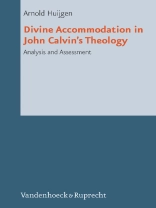Arnold Huijgen analyses und assesses the idea of divine accommodation in John Calvin’s theology. He proves that Calvin’s idea of accommodation was terminologically influenced by Erasmus, while its content originated in patristic theology. Though Calvin’s idea of accommodation is multifaceted, Huijgen subsumes and analyzes it in the light of the two main perspectives of pedagogy and revelation. The pedagogical aspect relates to Calvin’s understanding of salvation history, and the relation between the Old and the New Testament. In this perspective Christ as the mediator holds a central position. The aspect of revelation focuses on Calvin’s comprehension of God’s nature which for him is behind God’s revelation. Calvin’s understanding of accommodation implies a distinct dynamic to revelation, which is disrupted by its static, hierarchical ontology. Huijgen points out the weaknesses of Calvin’s idea of accommodation on the basis of modern critiques by Karl Barth, Isaak August Dorner, and Harry M. Kuitert; he also explores the viable points for present day theology.
关于作者
Arnold Huijgen is Professor of Dogmatics at the Protestant Theological University in Amsterdam, The Netherlands. He is the secretary of the Presidium of the International Calvin Congress.












